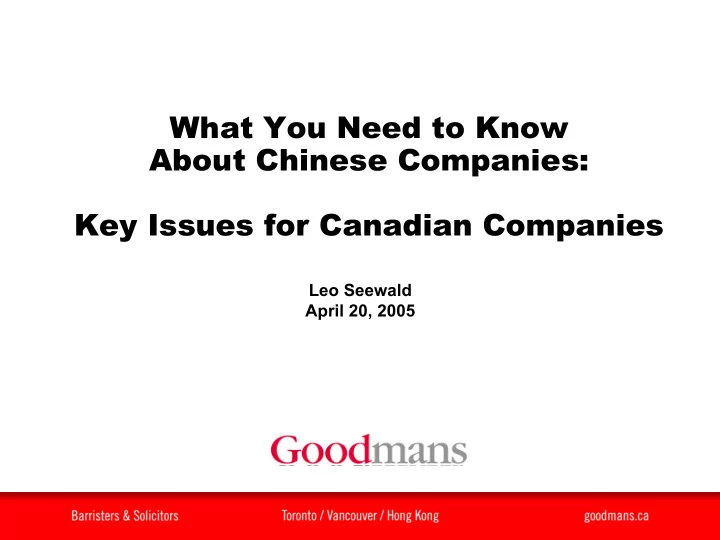

What You Need to Know About Chinese Companies: Key Issues for Canadian Companies Leo Seewald April 20, 2005
Chinese Local Enterprises • Individually Owned (sole proprietorships) • Partnerships • Collectively Owned (Cooperative) Companies • State Owned Enterprises • Limited Liability Companies • Joint Stock Companies Also a large class of unregistered enterprises doing business in China 2
Issues with Various Types of PRC Enterprises • Individually Owned Enterprises • Unlimited personal liability for the owner • Cannot enter into agreements with foreign parties • Cannot enter into joint venture agreements with foreign parties • Co-mingling of funds • Partnerships • Unlimited joint and several liability of partners • Partners cannot operate a business that competes with the business of the partnership • Distribution of profits to embody the concept of “voluntariness, equality, and fairness and good faith” 3
Issues with Various Types of PRC Enterprises (cont’d) • Collectively Owned (Cooperative) Companies • Rarely used now • Often used in the past as a way for pri v ate individuals to operate a company • Cannot enter into joint venture agreements • State Owned Enterprises • Often carrying historical burd e ns • Retired/non-existing employees that are (still) on the payroll • Often do not have the required approvals • Land ownership issues 4
Issues with Various Types of PRC Enterprises (cont’d) • Limited Liability Companies • Most common type of company • At least two shareholders required (often held in trust for one true owner) • Similar to the concept of limited liability corporations in Canada • Supervisory Board • Legal Representative = Chairman 5
Issues with Various Types of PRC Enterprises (cont’d) • Joint Stock Companies • Company limited by shares • Required structure for PRC companies listing on Shanghai or Shenzhen stock exchanges • At least five shareholders • More stringent corporate governance requirements 6
A Closer Look at PRC Limited Liability and Joint Stock Companies Shareholders Board of Directors and Supervisory Board Chairman/Legal Representative General Manager Deputy Manager Other Managers 7
Corporate Governance • There are three main reasons corporate governance matters are not a major concern for PRC companies: • Difficult business culture • Closely held • Short term approach 8
Corporate Governance • There are four primary problems that result from the lack of good corporate governance in PRC companies: • Transparency • Corporate structure often problematic Complex structures (so it can be difficult to know what type of • enterprise you are dealing with) Not properly established • Difficult to determine true ownership • • Not familiar with due diligence process (reluctant to disclose information to outside parties) • Accounting • Most enterprises file the required financial information, but this is an issue of form over function • Not GAAP to say the least 9
Corporate Governance • Minority Shareholder Rights • Not well understood • Most companies closely held (often by families) • Related Party Transactions • Significance of non-arm’s length transactions not understood • Very common in PRC companies • Foreign companies must pay particular attention to non-arm’s length transactions when partnering with PRC companies 10
DD Issues • Laws are often unclear / not implemented • Laws / policies are not always made public • Local treatment of laws / procedures is common • Non-compliance with laws is common (often for practical reasons) • Difficult to do credit / litigation searches • Legal opinions not always reliable 11
Contacts at Goodmans: • Toronto Ken Wiener Suite 2400, 250 Yonge Street Toronto (416) 979-2211 email: kwiener@goodmans.ca • Hong Kong Leo Seewald 11 th Floor, 9 Queen’s Road Central Hong Kong (852) 2848-4886 email: lseewald@goodmans.ca • Vancouver Bruce Wright Suite 1900, 355 Burrard Street Vancouver (604) 682-7737 email: bwright@goodmans. ca 12
Recommend
More recommend